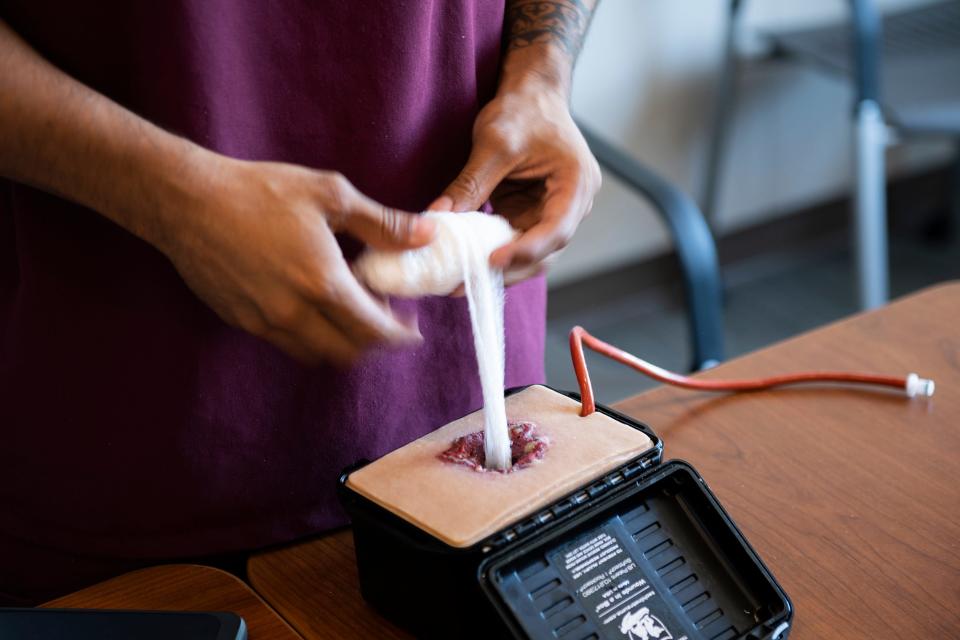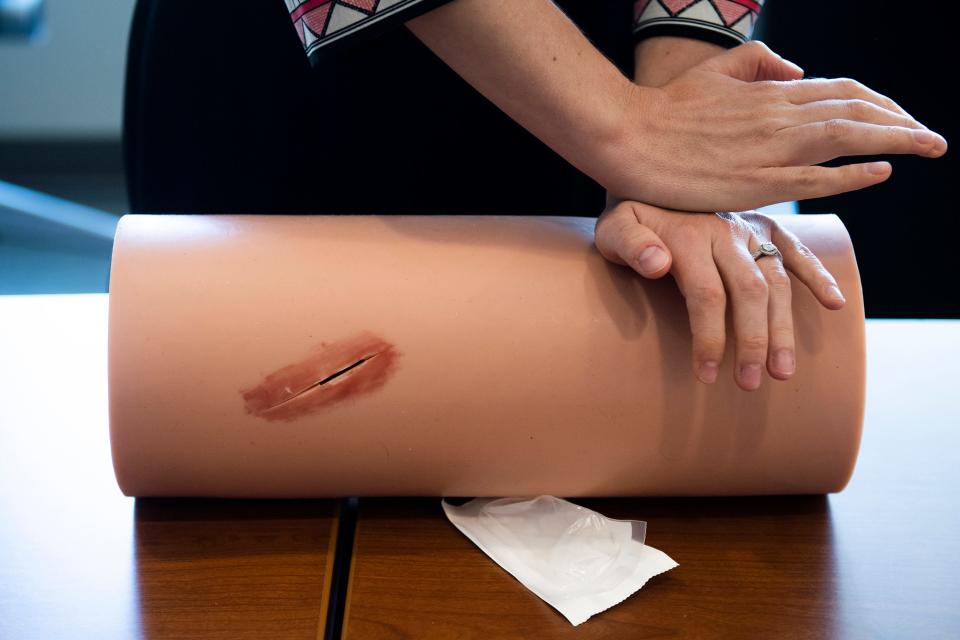South Jersey healthcare workers offer lifesaving 'Stop the Bleed' training
- Oops!Something went wrong.Please try again later.
CAMDEN — In the South Jersey region, it takes on average about 7 to 10 minutes for emergency personnel to respond to a call, Sarah Cunningham pointed out to the room full of medical professionals at MD Anderson Cancer Center at Cooper.
But it only takes about 3 to 5 minutes for a person with a critical wound — a gunshot, a shard of glass or metal from an auto collision, a severed or badly cut limb from an industrial accident — to bleed out and die.
Cunningham, a nurse practitioner with Cooper University Health, knows from years of experience working in trauma care that those few minutes can mean the difference between life and death, so she's taken her medical expertise into schools, police and fire departments, teaching people to Stop the Bleed.
Stop the Bleed is a training program that began in the wake of the 2012 Sandy Hook Elementary School shooting that killed 28 students and faculty members in Newtown, Connecticut.
The American College of Surgeons, working with government agencies including the Department of Defense, Department of Homeland Security, FEMA, FBI and U.S. Fire Administration, as well as Hartford Insurance and Johnson & Johnson, among others, created the training, which typically lasts about 45 minutes to an hour. The training is free, Cunningham explained, and available through Cooper.

Virtua Health also offers the training, a spokeswoman there said, and a spokesman for Inspira Health said that although the pandemic interrupted its Stop the Bleed training, "We stand ready to do so" when any school, agency or company requests the training.
According to the Gun Violence Archive, an independent research organization, there have been 356 mass shootings (four or more people shot, not including the shooter) in the United States in since 2013. Questions about the police response to the school shooting in Uvalde, Texas, left some wondering whether lives could have been saved if victims had received medical attention sooner.
But it's not just the all-too-familiar and tragic scenario of a mass shooting where Stop the Bleed training can save lives, Cunningham noted: As a trauma nurse, she's seen victims of car crashes from South Jersey's busy highways, workers injured at their jobs in warehouses and ports, hunting accidents, even deep cuts from gruesome kitchen mishaps.
So while she never wants to see mass shootings normalized, she does want Stop the Bleed training to be.
A trauma nurse since 2008 and a nurse practitioner since 2013, the West Deptford resident is also the mother of three young children, so she, like every other parent, has imagined the nightmare scenario of a school shooting or other catastrophe.
"The goal is (for a company, school or other entity) to make its staff feel comfortable knowing how to stop someone from bleeding," she said, buying them time until emergency medical services can render aid. "This should be something that's taught just like the Heimlich maneuver or CPR."
Cooper has offered the training since 2017, she said. The health system has partnered with school districts in Riverside, Williamstown and Collingswood; with the Camden County Police Department, Camden County Sheriff's Office, New Jersey State Police and Rutgers-Camden Campus Police; as well as a Berlin church, a Camden nonprofit, a library and a Girl Scout troop in Gloucester County.
Of course, learning CPR and the Heimlich can feel a little less intimidating to people without a medical background than stuffing a wound or applying a tourniquet.

"Exposure to blood is a real thing," Cunningham acknowledged; instructors encourage the use of gloves and other protective equipment if possible and, since few people outside the medical profession have PPE on hand, anyone who's had contact with blood, especially to the face, eyes or mouth, to immediately tell EMS and seek medical attention once the emergency has passed.
"We hope people can put their fear aside and give another person that a chance to live," she said.
Participants are shown a presentation, with the ABCs spelled out:
Alert 911;
Bleeding (find the source of it);
Compress.
The first thing Stop the Bleed teaches, though, is to make sure no further blood is shed — ensuring one's own safety is paramount, and instructors emphasize that no one, no matter how well-intentioned, will be helpful if they are injured themselves. Calling 911 right away, even if the immediate threat no longer exists, can save precious time.
Stop the Bleed kits, with PPE, gauze and tourniquets, are free as well. Cunningham hopes someday they are as ubiquitous in offices, schools and places of worship as defribrillators and CPR kits.
"AEDs (automated electric defibrillators) have saved countless lives, and hopefully these can, too," she said.
At the MD Anderson at Cooper conference room, Cunningham and Melissa Wilkins, an LPN and trauma nurse navigator, demonstrated the proper techniques, then let participants try themselves to pack "wounds" in rubber models and apply tourniquets on each other, a practice that can be painful but preferable to losing a limb or bleeding out.
The participants, all from the hospital's Research and Clinical Trials department, don't usually deal with wound care.
But, said Mary Schafer, "you can use this anytime, anywhere."
"This is the world we live in today," said Schafer, a clinical research coordinator from Haddonfield. "You never know when you might need this."
Learn more
For more information on Stop the Bleed, visit www.stopthebleed.org/. Click on the "Resource Hub" tab for downloadable instructional charts or to watch video demonstrations.
To arrange Stop the Bleed training, contact Sarah Cunningham at Cooper University Health at 856-342-3430 or by email at cunningham-sarah@cooperhealth.edu; Phyllis Worrell at Virtua at 888-VIRTUA-3 or Inspira Health at 800-INSPIRA
Phaedra Trethan has been a reporter and editor in South Jersey since 2007 and has covered Camden and surrounding areas since 2015, concentrating on issues relating to quality of life and social justice for the Courier-Post, Burlington County Times and The Daily Journal. She's called South Jersey home since 1971. Contact her with feedback, news tips or questions at ptrethan@gannettnj.com, on Twitter @By_Phaedra, or by phone at 856.486-2417.
Help support local journalism with a digital subscription.
This article originally appeared on Cherry Hill Courier-Post: NJ active shooter training: 'Stop the Bleed' offered in South Jersey

